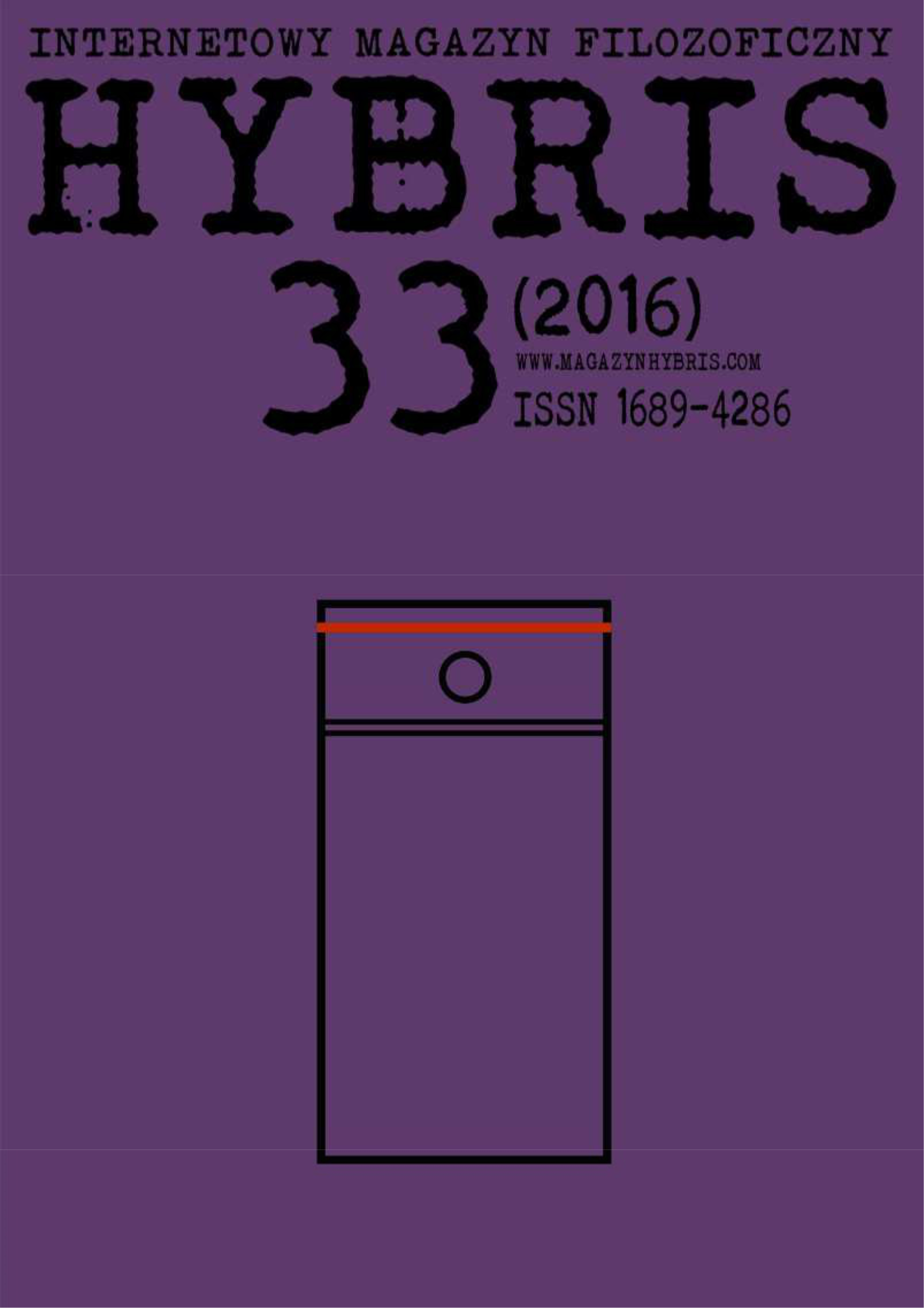Moralność ateizmu a niemoralnosć teizmu w świetle poglądów Paula-Henri Holbacha
DOI:
https://doi.org/10.18778/1689-4286.33.02Słowa kluczowe:
Holbach, ateizm, teizm, moralność, etyka, Bóg, naturaAbstrakt
This paper presents some reflections referred to the alleged advantage of the atheistic morality over the theistic morality. It refers especially to the philosophy of religion and morality developed by Paul Henri-Holbach. His main idea states that religion has negative impact on the human natural morality.
Bibliografia
Atran, Scott, 2002, In Gods We trust: The evolutionary Landscape of Religion, New York Oxford: Oxford University Press.
Zobacz w Google Scholar
Baggett, David, Walls, Jerry L., 2011, Good God: The Theistic Foundations of Morality, Oxford: Oxford University Press.
Zobacz w Google Scholar
DOI: https://doi.org/10.1093/acprof:oso/9780199751808.001.0001
Barrett, Justin L., 2010, The relative unnaturalness of atheism: On why Geertz and Markússon are both right and wrong, Religion 40.
Zobacz w Google Scholar
DOI: https://doi.org/10.1016/j.religion.2009.11.002
Boyer, Pascal, 2001, Religion explained. The evolutionary origins of religious thought, New York: Perseus.
Zobacz w Google Scholar
Bremer, Józef, 2010, Wprowadzenie do filozofii umysłu, Kraków: WAM.
Zobacz w Google Scholar
Churchland, Patricia, 2013, Moralność mózgu. Co neuronauka mówi o moralności, przeł. M. Hohol i N. Marek, Kraków: Copernicus Center Press.
Zobacz w Google Scholar
Feuerbach, Ludwig, 1959, O istocie chrześcijaństwa, przeł. A. Landman, Warszawa: PWN.
Zobacz w Google Scholar
Finance de, Joseph, 1969, Ateismo e problema morale, [w:] Giulio Girardi (red.), L’ateismo contemporaneo, t. 3, Torino: Societa Editrice Internazionale.
Zobacz w Google Scholar
Freud, Zygmunt, 1995, Przyszłość pewnego złudzenia, [w:] Zygmunt Freud, Kultura jako źródło cierpień, przeł. J. Prokopiuk, Warszawa: Wydawnictwo KR.
Zobacz w Google Scholar
Gervais, Will M., Shariff, Azim F., Norenzayan, Ara., 2011, Do you believe in atheists? Distrust is central to anti-atheist prejudice, Journal of Personality and Social Psychology, December, 101(6).
Zobacz w Google Scholar
DOI: https://doi.org/10.1037/a0025882
Girardi, Giulio, 1969, Fondamenti teoretici degli ateismi contemporanei, [w:] Giulio Girardi (red.), L’ateismo contemporaneo, t. 3, Torino.
Zobacz w Google Scholar
Greval, Daisy, 2012, In Atheists We distrust, Scientific American, January 17, http://www.scientificamerican.com/article/in-atheists-we-distrust/ (27.08.2014).
Zobacz w Google Scholar
Harris, Sam, 2011, The God Debate II: Harris vs. Craig, https://www.youtube.com/watch?v=yqaHXKLRKzg (17.09.2014).
Zobacz w Google Scholar
Helvetius, Claude, Adrien, 1959, O umyśle, t. 1, przeł. J. Cierniak, Warszawa: PWN.
Zobacz w Google Scholar
Holbach, Paul-Henri, 1957, System przyrody, t. 2, przeł. K. Szaniawski, Warszawa: PWN.
Zobacz w Google Scholar
Leeuw, Gerardus, van der, 1997, Fenomenologia religii, przeł. J. Prokopiuk, Warszawa: Książka i Wiedza.
Zobacz w Google Scholar
Mettrie, Julien Offray de la, 1953, Człowiek-maszyna, przeł. S. Rudniański, Warszawa: PWN.
Zobacz w Google Scholar
Norenzayan, Ara, 2013. Big Gods: How Religion Transformed Cooperation and Conflict, Princeton University Press.
Zobacz w Google Scholar
DOI: https://doi.org/10.1515/9781400848324
Nowicki, Andrzej, 1963, Kazimierz Łyszczyński, wybitny myśliciel polski, autor ateistycznego traktatu „De non existentia Dei”, Warszawa.
Zobacz w Google Scholar
Odifreddi, Piergiorgio, 2007, Perché non possiamo essere Cristiani, Milano: Mondadori.
Zobacz w Google Scholar
Pastuszka, Józef, 1946, Psychologiczne źródła niewiary, Lublin: Towarzystwo Naukowe KUL.
Zobacz w Google Scholar
Ramachandran, Vilayanur, S., Dr. V. S. Ramachandran on Temporal Lobe Epilepsy, https://www.youtube.com/watch?v=deDrVZfvDbM (17.09.2014).
Zobacz w Google Scholar
Ratcliffe, Matthew, 2003, Scientific naturalism and the neurology of religious experience, Religious Studies, 39 (3), Cambridge.
Zobacz w Google Scholar
DOI: https://doi.org/10.1017/S0034412503006413
Rubczyński, Witold, 1925, Nowa próba wyjścia poza relatywizm w teorii wartości, nadbitka z Kwartalnika Filozoficznego.
Zobacz w Google Scholar
Sterelny Kim, Joyce R., Calcott B., Fraser B. (eds.), 2013. Cooperation and its evolution, MIT, Cambridge MA: MIT Press.
Zobacz w Google Scholar
DOI: https://doi.org/10.7551/mitpress/9033.001.0001
Szocik, Konrad, 2013. Traktat o trzech oszustach: Mojżeszu, Jezusie i Mahomecie jako przykład radykalnej krytyki religii pozytywnych, Przegląd Filozoficzny. Nowa Seria, R. 22, Nr 1 (85), s. 127–135.
Zobacz w Google Scholar
Szocik, Konrad, 2014a, Kognitywna teoria religii a naturalność teizmu i ateizmu. Krytyka założenia o intuicyjnej religijności człowieka, [w:] J. Woleński, A. Dąbrowski (red.), Metodologiczne i teoretyczne podstawy kognitywistyki, Kraków: Copernicus Center Press.
Zobacz w Google Scholar
Szocik, Konrad, 2014b, Ateizm filozoficzny. Zarys historii i krytyka neotomistyczna, Kraków: Nomos.
Zobacz w Google Scholar
Tancredi, Laurence, 2010, Hardwired Behavior: What Neuroscience Teaches About Morality, Cambridge: Cambridge University Press.
Zobacz w Google Scholar
Visala, Aku, 2011, Ashgate Science and Religion: Naturalism, Theism and the Cognitive Study of Religion: Religion Explained?, Ashagate: Farnham Surrey.
Zobacz w Google Scholar
Pobrania
Opublikowane
Jak cytować
Numer
Dział
Licencja

Utwór dostępny jest na licencji Creative Commons Uznanie autorstwa – Użycie niekomercyjne – Bez utworów zależnych 4.0 Międzynarodowe.






